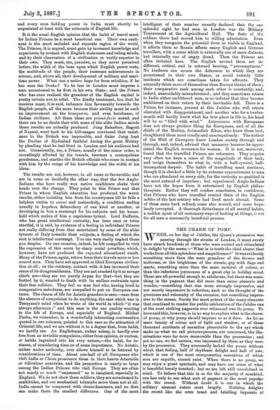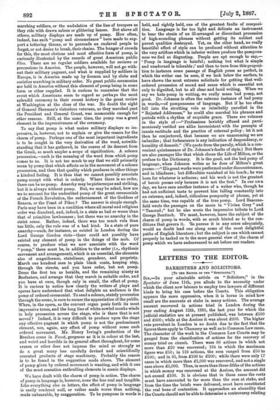THE CHARM OF POMP.
WHEN, on her day of Jubilee, the Queen's procession was passing through the streets of London, it must surely have struck hundreds of those who were excited and stimulated to delight bythe scene,—' What is in truth the chief charm that works from all this splendour and magnificence?' It wasevidently something more than the mere grandeur of the dresses and uniforms, or the brightness of the streets, gay with flags and masts, something more than the mere carnival of colony, or than the infections joyousness of a great city in holiday mood. These are all-powerful enough to exhilarate, but there was some- thing in the pageant that did more than cause pleasure and wonder,—something that was more strongly impressive, and not merely impressive in reflection, such as the thought of the greatness and solemnity of the occasion, but something impres- sive to the senses. Surely the most potent of the many elements that combined to render the public celebration of the Jubilee one of the most striking pageants ever witnessed was its pomp. To have said this, however, is in no way to explain what is the charm of pomp, or why pomp should impress us as it does. As far as mere beauty of colour and of light and shadow, or of those thousand accidents of sensation pleasurable to the eye which make up what we will picturesqueness, are concerned, the illu- minations were far more memorable than the procession ; and yet no one, we feel certain, was impressed by them as they were by the procession. They necessarily lacked the pomp without which that feeling, half of rhythmic delight and half of awe, which is one of the most overpowering sensations of which men are capable, cannot exist. When there is no pomp, we may enjoy a great spectacle, and may have our sense of what is beautiful keenly touched ; but we are left still unsubdued in mind. To believe that this is so for the majority of mankind, one has only to see what sort of pageant is the most popular with the crowd. Without doubt it is one in which the military element enters most largely. Nothing delights the crowd like the even tread and bristling bayonets of marching soldiers, or the undulation of the line of troopers as they ride with drawn sabres or glittering lances. But above all others, military displays are made up of pomp. How often, indeed, has such "pomp and circumstance " been made to sup- port a tottering throne, or to persuade an enslaved people to forget, or not desire to break, their chains. The hunger of crowds for this, the most obvious and most effective form of pomp, is curiously illustrated by the records of great American public files. There are no regular soldiers available for reviews or processions in America. The people, however, will not go with- out their military pageant, and what is supplied by soldiers in Europe, is in America made up by firemen and by clubs and societies marching in military order. No great public ceremonies are held in America without this element of pomp being in some form or other supplied. It is curious to remember that the event which Americans seem to regard as perhaps the most splendid ceremony in their recent history is the great review at Washington at the close of the war. No doubt the sight of General Sherman's victorious veterans, as they marched past the President and General Grant, was memorable enough for other reasons. Still, at the same time, the pomp was a great element in the impressiveness of the ceremony.
To say that pomp is what makes military displays so im- pressive, is, however, not to explain or give the reason for the charm of pomp. Perhaps one of the most important ingredients is to be sought in the very derivation of the word, notwith- standing that it has gathered, in the course of its descent from the Greek, so much ampler a scope of signification. A solemn procession,—such is the meaning of the word from which pomp comes to us. It is not too much to say that we still primarily mean by pomp that which affects us in the movement of a solemn procession, and then that quality which produces in other things a kindred feeling. It is thus that we cannot possibly associate pomp except with what is orderly. Where there is no order, there can be no pomp. Anarchy may be picturesque and striking, but it is always without pomp. Bat, we may be asked, how are we to account for the undoubted pomp of the great ceremonials of the French Revolution, the enthronement of the Goddess of Reason, or the Feast of Pikes P The answer is simple enough. Paris may have been in a condition where all moral and religions order was dissolved, and, indeed, in a state as bad or worse than that of primitive lawlessness ; but there was no anarchy in the strict sense. Rather, indeed, there was too much rule than too little, only the rule was of a bad kind. In a state of pure anarchy—such, for instance, as existed in London during the Lord George Gordon riots—there could not possibly have existed any element of pomp in the doings of the mob. Of course, to produce what we now associate with the word " pomp," there must be, in addition to the order (i.e., rhythmic movement and arrangement), which is an essential, the elements also of magnificence, stateliness, grandeur, and propriety. March one hundred men in plain black coats, keeping atep, through the streets, and you have order, but not pomp. Dress the first ten as heralds, and the remaining ninety as Beefeatere, and arrange that they march in suitable order, and you have at once, though only in small, the effect of pomp. It is curious to notice how clearly the writers of plays and operas have understood that what delights an audience is the pomp of ordered ceremonial. To send a solemn, stately procession through the scene, is sure to secure the appreciation of the public. When, in the opera, as the convent organ peals forth its most impressive tones, and the long line of white-oowled monks winds in holy procession across the stage, who is there that is not moved P Indeed, it is very difficult to produce upon the stage any effective pageant in which pomp is not the predominant element, nor, again, any effect of pomp without some such ordered movement. Mr. Henry Irving's production of the Brocken scene in Faust, gorgeous as it is in colour at the last, and weird and horrible in its general effect throughout, for some reason or other does not impress the mind so strongly ae do a great many less carefully devised and scientifically executed products of stage machinery. Probably the reason is to be found in the suggestion made above. The element of pomp given by ordered movement is wanting, and with it one of the most sensation enthralling elements in scenic displays.
We have dealt with the charm of pomp in action. The charm of pomp in language is, however, none the less real and tangible. Like everything else in letters, the effect of pomp in language is easily rendered null, or rather made worse than nothing, made unbearable, by exaggeration. To be pompous in words is
held, and rightly held, one of the greatest faults of composi- tion. Language is far too light and delicate an instrument to bear the strain of an ill-arranged or discordant procession of high-sounding phrases without getting its noblest, and purest qualities destroyed. Yet, on the other hand, no really beautiful effect of style can be produced without attention to the very artifices which in inferior writers produce the pompous- ness we find so disgusting. People are apt enough to say,— ' Pomp in language is hateful; nothing but what is simple and unadorned is tolerable ;' and then to turn from this proposi- tion to instance some passage of English prose as perfect, in which the writer can be seen, if we look below the surface, to have shown the most extreme solicitude for getting that well- ordered procession of sound and sense which is essential not only to dignified, but to all clear and lucid writing. When we say we hate pomp in writing, we really mean bad pomp, not good. Dr. Johnson is often the extreme instance of bad pomp in words,—of pompousness of language. But if he too often fell into the strutting vein so inimitably parodied in the "Rejected Addresses," he could also marshal his phrases and periods with a rhythm of exquisite grace. There are volumes in the style of :—" Professions lavishly effused and parsi- moniously verified are alike inconsistent with the precepts of innate rectitude and the practice of external policy : let it not then be conjectured, that because we are unassuming we are imbeciles ; that forbearance is any indication of despondency, or humility of demerit." (We quote from the parody, which is a con- venient quintessence of Dr. Johnson's faults of style.) But there are also passages like that which closes the Life of Milton, or the preface to the Dictionary. It ie the good, not the bad pomp of language, when Johnson writes as he does of Milton's great poems :—"His great works were performed under discountenance, and in blindness ; but difficalties vanished at his touch; he was born for whatever is arduous; and his work is not the greatest of heroic poems only because it is not the first." In our own day, we have seen another instance of a writer who, though he had not sufficient taste to prevent him falling constantly into an extreme, and, indeed, ridiculous pomposity of phrase, yet at the same time, was capable of the true pomp. Lord Beacons. field wrote the passages on the moon in " Vivian Grey " and " Tancred ;" but he also wrote the impressive tribute to Lord George Bentinck. We must, however, leave the subject of the charm of pomp in words, with so much hinted as to the con- ditions that govern it. lo pursue it in any sense adequately, would no doubt lead one along some of the most delightful paths of English literature ; but the subject is one which cannot properly be tacked on to the more general view of the charm of pomp which we have endeavoured to set before our readers.



































 Previous page
Previous page